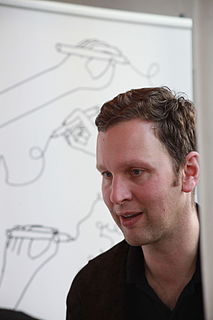A Quote by Anne Bogart
The Japanese director Tadashi Suzuki once stated, 'International cultural exchange is impossible - therefore we must try.' I agree with all my heart. The impossibility of seeing beyond one's own cultural context is a political act in the world and has the potential to break down the rigid assumptions surrounding us.
Related Quotes
The enormous social change involved in a sexual revolution is basically a matter of altered consciousness, the exposure and elimination of social and psychological realities underlying political and cultural structures. We are speaking, then, of a cultural revolution, which, while it must necessarily involve the political and economic reorganization traditionally implied by the term revolution, must go far beyond this as well.
And make no mistake: irony tyrannizes us. The reason why our pervasive cultural irony is at once so powerful and so unsatisfying is that an ironist is impossible to pin down. All U.S. irony is based on an implicit "I don’t really mean what I’m saying." So what does irony as a cultural norm mean to say? That it’s impossible to mean what you say? That maybe it’s too bad it’s impossible, but wake up and smell the coffee already? Most likely, I think, today’s irony ends up saying: "How totally banal of you to ask what I really mean.
We saw, then, journalists and researchers being arrested. And so this is sort of the latest expansion they say - cultural targets where young people gather, where they exchange cultural and political ideas. So that may be one of the reasons, although the government hasn't made any public comments on these raids.
Tunisia's responsibility, and especially that of its political and intellectual elites, is enormous. All the protagonists of the nation's social, cultural, economic and political life must work to overcome useless and counterproductive polarisation, and to find solutions to domestic, regional and international problems.
The term Hispanic, coined by technomarketing experts and by the designers of political campaigns, homogenizes our cultural diversity (Chicanos, Cubans, and Puerto Ricans become indistinguishable), avoids our indigenous cultural heritage and links us directly with Spain. Worse yet, it possesses connotations of upward mobility and political obedience.
Cultural conditioning is like bad software. Over and over it's diddled with and re-written so that it can just run on the next attempt. But there is cultural hardware, and it's that cultural hardware, otherwise known as authentic being, that we are propelled toward by the example of the shaman and the techniques of the shaman. ... Shamanism therefore is a call to authenticity.
Cultural speciation had been crippling to human moral and spiritual growth. It had hindered freedom of thought, limited our thinking, imprisoned us in the cultures into which we had been born. . . . These cultural mind prisons. . . . Cultural speciation was clearly a barrier to world peace. So long as we continued to attach more importance to our own narrow group membership than to the ‘global village’ we would propagate prejudice and ignorance.
Re-vision – the act of looking back, of seeing with fresh eyes, of entering an old text from a new critical direction – is for woman more than a chapter in cultural history: it is an act of survival. Until we understand the assumptions in which we are drenched we cannot know ourselves. And this drive to self-knowledge, for women, is more than a search for identity: it is part of our refusal of the self-destructiveness of male-dominated society.







































